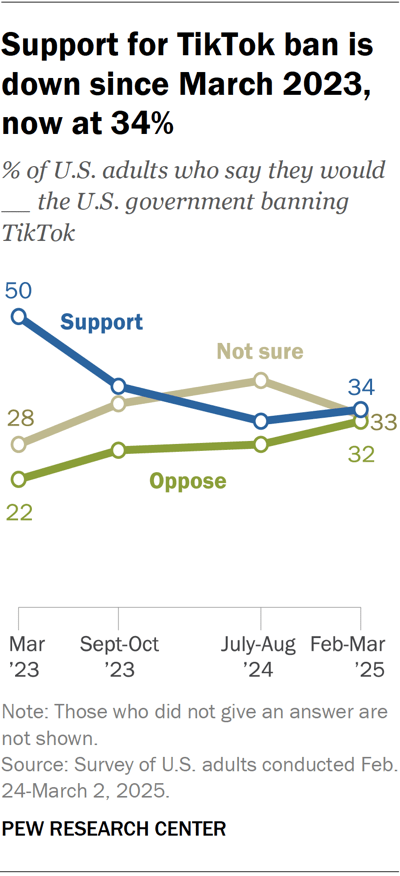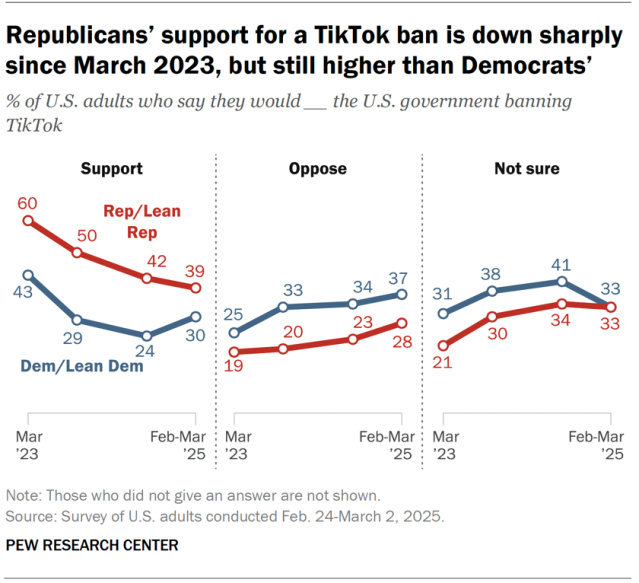TikTok Ban Support Dips in the U.S. Amidst Free Speech Concerns and Shifting National Security Perceptions
Table of Contents
- 1. TikTok Ban Support Dips in the U.S. Amidst Free Speech Concerns and Shifting National Security Perceptions
- 2. Declining Support: A Closer Look
- 3. Political Divide
- 4. User vs. Non-User Perspectives
- 5. Reasons Behind the Views: Data Security vs. Free Speech
- 6. Potential Counterarguments and Criticisms
- 7. Recent Developments and Practical Applications
- 8. What strategies could effectively balance national security concerns with teh preservation of free speech rights in the context of potential TikTok regulations?
- 9. Interview: Shifting Public Sentiment on the TikTok Ban with Dr. Anya Sharma
- 10. Free Speech Concerns and the TikTok Debate
- 11. Political and User Perspectives on Banning TikTok
- 12. Moving Forward: Data Security, Free Speech, and the Future
As the deadline looms for TikTok to be sold or face a potential ban in the United States, public sentiment is shifting. Support for a ban has decreased significantly since 2023, with increasing concerns about free speech playing a major role in shaping public opinion. archyde News delves into the latest data and examines the evolving landscape of this contentious issue.
By Archyde News

The debate over weather to ban TikTok in the U.S. is far from settled. A recent survey indicates that public support for a ban has fallen to 34% among U.S. adults, a significant drop from 50% in March 2023. this shift in public opinion comes as the clock ticks down to a critical April deadline, which could determine the platform’s fate in the country.
For the first time, a poll explores the reasons behind the public’s views on a potential ban.Those supporting a ban cite data security and TikTok’s Chinese ownership as primary concerns. Conversely, those opposing a ban are increasingly worried about the implications for free speech. This divide underscores the complex interplay between national security concerns and constitutional rights in the digital age.
The perception of TikTok as a national security threat has also declined, from 59% in 2023 to 49% in the latest survey. This evolving perception, coupled with growing free speech concerns, suggests a softening of public opinion towards the platform, even as lawmakers continue to grapple with the potential risks associated with its ownership and data practices.
Declining Support: A Closer Look
The survey reveals a closely divided public, with 34% supporting a ban, 32% opposing it, and 33% remaining unsure. This division highlights the challenges policymakers face in addressing the TikTok issue, as any decision will likely be met with strong opposition from a significant portion of the population.
While support for a ban remained stable at 32% between summer 2024 and early 2025, the longer-term trend shows a considerable decline since spring 2023. Opposition has also increased, rising from 22% in spring 2023 to 32% currently. The number of undecided respondents has remained consistently high, indicating a degree of uncertainty and perhaps a lack of clear understanding of the issues at stake.

Political Divide
Political affiliation plays a significant role in shaping views on a TikTok ban. While support has declined in both parties as March 2023, Republicans are still more likely than Democrats to favor a ban (39% vs. 30%). However, the share of Democrats supporting a ban has slightly increased since last summer, suggesting a potential shift in sentiment within the party.
It’s important to note that these figures include independents who lean towards each party, providing a broader picture of partisan views on the issue. The differences in opinion between Republicans and Democrats reflect broader ideological divides regarding national security, data privacy, and the role of government in regulating technology companies.
User vs. Non-User Perspectives
Perhaps unsurprisingly, Americans who do not use TikTok are far more likely to support a ban (45%) than those who do (12%). this disparity highlights the disconnect between those who directly experience the platform and those who view it primarily through the lens of potential risks.
Support for a ban has remained relatively stable among both TikTok users and non-users since last summer but has declined since spring 2023. This suggests that while initial concerns about the platform may have subsided somewhat, underlying anxieties about its ownership and data practices persist, particularly among those who do not use the app themselves.
Reasons Behind the Views: Data Security vs. Free Speech
The survey sheds light on the primary reasons driving support for and opposition to a tiktok ban. Those who favor a ban often express concerns about data security and the platform’s ownership by a Chinese company. These concerns are rooted in fears that the Chinese government could access user data or use the platform to spread propaganda or misinformation.
Conversely, those who oppose a ban emphasize the importance of free speech and argue that a ban would violate the First Amendment rights of TikTok users. They also point to the platform’s role as a source of entertainment, facts, and community for millions of Americans, particularly young people.
Potential Counterarguments and Criticisms
The debate surrounding a TikTok ban is complex and multifaceted, with valid arguments on both sides. Critics of a ban argue that it could set a hazardous precedent for government censorship and could harm American businesses that rely on the platform for advertising and marketing.
Others argue that a ban would be ineffective, as users could simply access TikTok through vpns or other means. They also suggest that the U.S.government shoudl focus on addressing data security concerns through more targeted measures, such as requiring TikTok to store user data in the United States or to submit to independent audits.
Recent Developments and Practical Applications
As the April deadline approaches, the future of TikTok in the U.S. remains uncertain. The Biden governance is reportedly considering various options, including requiring TikTok to be sold to an American company or implementing stricter data security measures.
Meanwhile, TikTok has taken steps to address concerns about data security, including partnering with Oracle to store U.S.user data on American servers. The company has also emphasized its commitment to protecting user privacy and combating misinformation.
The outcome of this debate could have significant implications for the future of social media and the balance between national security, free speech, and economic interests in the digital age. It also raises broader questions about the role of government in regulating technology companies and protecting user data.
What strategies could effectively balance national security concerns with teh preservation of free speech rights in the context of potential TikTok regulations?
Interview: Shifting Public Sentiment on the TikTok Ban with Dr. Anya Sharma
Archyde News sits down with Dr. Anya Sharma, a leading expert in digital media and public policy, to discuss the evolving landscape of the TikTok ban debate in the U.S.
Interviewer: Dr. Sharma, thank you for joining us. Recent data shows a important drop in support for a TikTok ban. How would you describe the primary drivers behind this shift in public opinion since 2023?
Dr. Sharma: Thank you for having me. indeed, the trend is quite clear. ThereS been a considerable decline in favor of a ban. Two major factors are at play: increasing concerns about free speech and a softening of the perception of TikTok as a direct national security threat. While security concerns persist,the public is increasingly weighing those against potential infringements on constitutional rights and access to facts.
Free Speech Concerns and the TikTok Debate
Interviewer: The data points to a significant segment of the population opposing the ban due to free speech concerns.How has this argument gained traction?
Dr. Sharma: TikTok has become a platform for entertainment, education, and community for millions. Proponents of free speech argue that banning it would be government censorship, setting a risky precedent. They also point out its role as a source of information and expression for many young people, making the argument about the right to access this platform.
Political and User Perspectives on Banning TikTok
Interviewer: The survey data highlights a political divide. How do Republicans and Democrats differ in their views, and what explains this?
Dr. Sharma: While support has waned across both parties, Republicans still largely favor the ban more than Democrats. This likely reflects broader stances of national security and the role of government regulation. Democrats often lean towards protecting individual freedoms, which is influencing support.
Interviewer: The survey also reveals differences between users and non-users. What does this disparity tell us about the public’s perception?
Dr. Sharma: As expected, non-users are more prone to support the ban. This indicates a disconnect between those experiencing the platform directly and those viewing it through the lens of potential risks. Non-users might potentially be more influenced by the narrative around data security risks, rather than experiencing the platform’s benefits firsthand.
Moving Forward: Data Security, Free Speech, and the Future
Interviewer: What are the possible resolutions to this issue, considering the April deadline and the concerns around both data security and free speech?
Dr. Sharma: The future remains hazy. The Biden governance may consider options like requiring TikTok to be sold to an American company or implementing stricter data security measures. The government could focus on targeted measures, like ensuring user data is stored in the U.S. Solutions must strike a balance between national security, free speech, and economic considerations.
Interviewer: If you could ask the public one question to foster discussion, what would it be?
Dr. Sharma: I’d ask: Considering the potential benefits and risks of TikTok, what measures, if any, would be acceptable to you to balance national security and individual expression and access?







